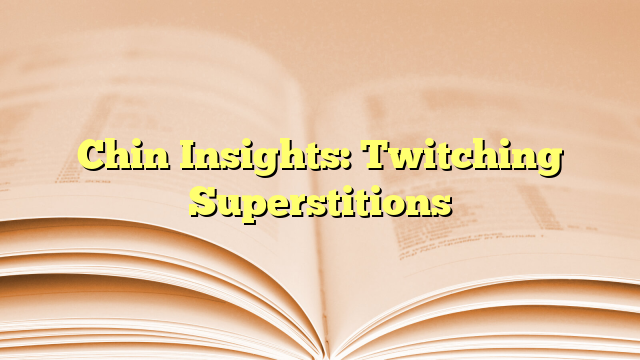The superstition of twitching chin, also known as chin quivering or chin jerking, is a fascinating cultural belief that has intrigued people across various cultures for centuries. This phenomenon is often interpreted as a sign with different meanings and implications depending on cultural contexts and beliefs.
Origins and Cultural Context: The origins of the twitching chin superstition are rooted in ancient folklore and cultural traditions. Different cultures around the world have attributed various meanings to this phenomenon, often linking it to luck, omens, or even as a precursor to specific events.
Interpretations and Beliefs:
- Chinese Culture: In Chinese superstition, a twitching chin is often seen as a sign of impending good luck or financial gain. Depending on whether it’s the left or right chin twitching, different interpretations arise – left is associated with receiving money, while right is linked to social interactions.
- Indian and Hindu Beliefs: In Hindu traditions, body twitches are believed to be linked to planetary influences. Twitching on the chin might indicate specific planetary alignments and their effects on an individual’s destiny.
- Western Beliefs: In Western cultures, twitching chin is sometimes associated with gossip. Some believe that if your chin is twitching, someone is talking about you behind your back.
- African Traditions: In some African cultures, a twitching chin is considered a sign of spiritual or ancestral communication. It might indicate that ancestral spirits are trying to convey a message.
- Filipino Folklore: In Filipino superstition, a twitching chin is believed to predict the arrival of a visitor. The side of the chin that twitches could signify whether the visitor is male or female.
Cross-Cultural Superstitions: While the specific interpretations vary, it’s intriguing to note the shared belief across cultures that body twitches hold significance beyond mere physical occurrences. Similar superstitions exist for twitching eyelids, palms, and other body parts, emphasizing the universal fascination with interpreting bodily sensations.
Psychological and Scientific Explanation: Twitching chin, like other muscle twitches, is primarily caused by involuntary contractions of muscles due to fatigue, stress, or nerve irritation. In many cases, there’s no scientific basis to link these twitches to specific events or outcomes. However, the human mind is wired to seek patterns and meaning, leading to the development of cultural superstitions around these phenomena.
Conclusion: The superstition of twitching chin provides a glimpse into the intricate tapestry of cultural beliefs and human psychology. While the phenomenon itself has a scientific explanation rooted in muscle contractions, its diverse interpretations across cultures highlight the human desire to seek meaning in everyday occurrences. Whether seen as omens, signs of communication, or predictors of future events, the twitching chin superstition serves as a reminder of the rich cultural diversity and the fascinating ways in which people engage with the mysteries of life.
